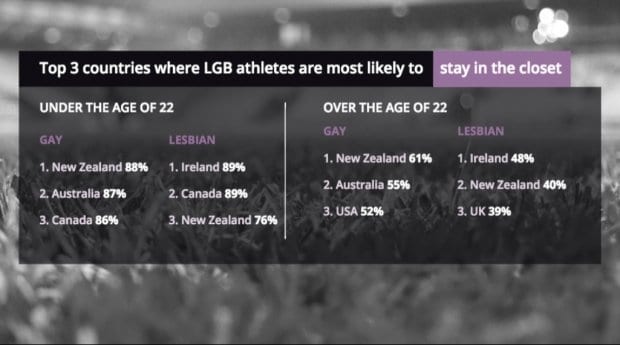According to the Canadian participants in an international survey, physical education classes are the most homophobic sport environment, says Erik Denison, co-author of Out on the Fields.
Denison says he was inspired to create what he says is the first international survey on homophobia in sport due to his own athletic experiences while attending high school in Vancouver.
“PE class is a hotbed of homophobia. Boys are allowed to do whatever they want and often that includes abusing the gay kids,” says Denison, who now resides in Australia.
Denison says that after he came out, the bullying got worse. “That’s when my PE teacher told me ‘we can’t keep you safe, so don’t come to class anymore.’ Instead of dealing with the problem, they just got rid of me.”
The nearly 80-page final report ranked Canada first overall, but Denison says that this is not something to be proud of.
Canada is “the best of the worst,” with an inclusion score of 148 out of a possible score of 500, Denison says. The survey’s 9,494 participants were largely from the US, UK, Australia, Ireland, New Zealand and Canada, with 373 people from other countries.
The information, which was collected by a global sports market research firm, was reviewed by seven academics from four different countries, including professor Guylaine Demers from Laval University in Quebec, and Dr Sandra Kirby, from the University of Winnipeg.
The survey focused on topics including the impact of homophobia on levels of participation in team sports, coming-out politics for queer athletes, degrees of acceptance in sporting culture, and identifying forms of homophobic behaviour.
The study had a strong emphasis on youth participation in sport, stating that young queer athletes (under 22 years of age), were much more likely to report personally experiencing homophobia.
Michel Beauchamp, who lives in Gatineau, Quebec and worked as a substitute PE teacher for 12 years, says that homophobia is prevalent in gym classes because it is more difficult for teachers to monitor interactions between students in that kind of environment.
“Mainly it’s gay slurs that are not even in a context where it’s relevant. Not that there’s a relevant context, but they’re being called gay in situations where you don’t even know where it’s coming from. Or, a kid will do something that doesn’t seem to be masculine and they’ll pick on him,” Beauchamp says. “It’s a fashionable way to insult others.”
Denison says that coaches and teachers need to receive proper training on how to support queer youth.
One of the ways this can be achieved, Beauchamp says, is by ensuring that young athletes have a network of people that they trust and can talk to.
The study also assessed the impact of homophobia on sports fans, and found that 78 percent of the study’s participants worldwide believe visibly queer spectators are not safe at sporting events.
Denison says that now that the results are public, LGBT organizations can use this data to lobby for change.
“Now that the problem is clear and there’s no debate over the fact that homophobia in sports exists, we need to help ourselves,” he says.
The entire study can be found here.


 Why you can trust Xtra
Why you can trust Xtra


